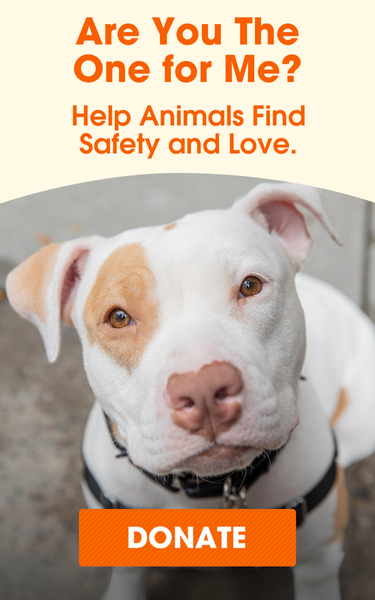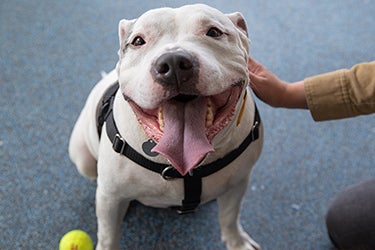
Fosters Needed in NYC at the ASPCA
...
Thanks for your interest in becoming a foster caregiver! We have an ongoing need for fosters throughout the year, especially for large dogs, neonatal kittens and shy/fearful cats.
Basic requirements for fosters include:
- Must be at least 18 years old
- Located in or near NYC
Get started here! The steps are simple:
- Create your personalized login
- Watch our 30-minute Foster Program Information Session
- Complete your foster application to tell us more about yourself and your experience
Thank you for your support!
ASPCA Fostering FAQs – Helpful Information About Our Foster Program
What kinds of animals need fostering?
Animals are available to foster for a variety of reasons. They may be ready for adoption, or not quite yet due to their individual needs. We most commonly need fosters for:
- Neonatal and young kittens (seasonally)
- Recovering, sick or injured cats and dogs (of all sizes)
- Adult cats and dogs with special behavioral needs
- Large-breed dogs
Opportunities to foster puppies and healthy small-breed dogs are infrequent.
Why do animals need foster caregivers?
- Kitten Season: Each year, the ASPCA supports vulnerable kittens born during the feline breeding season, or "kitten season," which extends from spring to fall. In many cases, these are neonatal “bottle babies” in need of round-the-clock care. Fostering kittens helps them thrive in a home environment and prepare for adoption. Kitten foster periods may range from one to ten weeks.
- Socialization: Some cats and dogs have had limited social experiences before arriving to the shelter and need an attentive foster caregiver to help socialize them so that they can become more confident and trusting.
- Information & Training: Sometimes animals behave differently in a shelter than at home. Animals who need a break from the shelter environment often benefit from time with a foster caregiver who can monitor certain behaviors and work to modify them through positive reinforcement training with the guidance of our behavior team.
- Medical Recovery: Many animals require special medical attention and may need a foster who can provide medicated baths, physical therapy, daily medication or other medical care with the guidance of our medical team.
- Adoption Ambassador: Adoption-ready animals may need a foster who can actively promote them to help us find their new home. If are skilled with social media or networking is your thing, you could be an Adoption Ambassador!
Why should I foster?
Fostering an animal is an impactful and rewarding experience, and it directly improves the lives of shelter animals. Whether you're helping a dog learn to thrive in a home environment and enjoy the company of people or supporting a cat recovering from illness, as a foster, you play an important role in an animal’s journey and can change their life for the better. Many of our animals come from tough circumstances and need someone special to help them along their journey—could that be you?
Will I need to provide all the food and supplies for my foster animal?
The ASPCA covers all foster animal medical care and expenses and provides foster caregivers with the food, equipment and supplies they need to support their foster animals. You provide your home, time, attention, commitment and love!
How long does fostering last?
Foster periods vary and can range from a few days to a few weeks, or even several months—it always depends on the individual animal's needs. When we seek foster homes, we make sure the needs and anticipated foster duration are clear so that you can be paired with the best match for your household and schedule.
Who can foster for the ASPCA?
To join the foster program, you must be:
- At least 18 years old
- Located in the NYC area and able to get to and from our Manhattan-based facilities as requested for foster pick-ups, drop-offs, medical appointments and supplies.
- If you are not in or near NYC, please visit our Find a Shelter page to find foster opportunities near you.
We also welcome foster caregivers with professional veterinary experience to assist animals who require special medical attention.
Can I foster if I have other pets at home?
Yes! If you have other pets, we ask that they are up to date on vaccinations and that you provide a separate space for your foster pet to allow for a gradual and safe introduction. For dog owners looking to foster dogs, we will often arrange a dog-dog meet & greet with our behavior team to set you up for success before taking a foster dog home.
If you foster for other organizations, that's great too! We just ask that you refrain from fostering for other organizations while you have an ASPCA animal in your care, in support of your foster animal's safety and health.
Will I need any special training to foster?
In addition to our on-demand orientation, the ASPCA provides additional training and materials to help support your fostering experience once you are accepted into the program. Though some foster opportunities do not require additional training, this depends on the needs of each animal, and we always encourage our fosters to continue to learn and develop their knowledge and skills. The more we learn, the more we can accomplish together!
If you’re interested in fostering neonate kittens, ASPCA staff will provide you with hands-on bottle-baby kitten training to prepare you to care for these very special kittens.
The ASPCA also offers robust foster engagement opportunities such as continuing education lectures about our work in NYC and across the country, feedback forums, monthly newsletters and more!
We have an ongoing need for volunteers throughout the year; visit our NYC Volunteer page to learn more! Thank you for your support and desire to help animals in need!
If you live outside of the New York City area and are interested in local fostering opportunities, find a shelter or rescue near you and contact them for more information.

